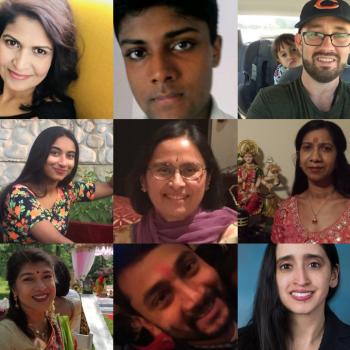Shaktism is a branch of Hinduism that focuses on the supreme power of the feminine energy. The highest form of God is a mother form in this system. According to Wikipedia:
Shaktism’s focus on the Divine Feminine does not imply a rejection of Masculine or Neuter divinity. However, both are deemed to be inactive in the absence of Shakti. As set out in the first line of Adi Shankara‘s renowned Shakta hymn,Saundaryalahari (c. 800 CE): “If Shiva is united with Shakti, he is able to create. If he is not, he is incapable even of stirring.”
Shakti is the energy itself and Devi is the goddess. MahaDevi means the supreme Goddess. Like in several other branches of Hinduism, this supreme goddess is said to encompass all. We are all, ultimately, this divine figure. She may be associated with any number of goddesses. For example, some might say that Durga is the MahaDevi.
Though I do believe that in the ultimate reality God/Goddess is neither masculine nor feminine, it is interesting that this branch makes female the default while all others make masculine the default. While other branches call the supreme God by a masculine name and people worship their individual gods, ishta-deva, in Shaktism, worshipers call the supreme divinity by a feminine name and worship individual goddesses as ishta-devi. It makes a certain sense to worship the power of femininity and particularly the life-giving force of motherhood.
It’s a little weird to talk about MahaDevi as an individual goddess, since she encompasses all goddesses in a way.
Here are some MahaDevi chants:
http://www.youtube.com/watch?v=YxgMarv7llIAn underlying theological assumption in texts celebrating the Mahadevi is that the ultimate reality in the universe is a powerful, creative, active, transcendent female being. The Lalita-sahasranama gives many names of the Mahadevi, and several of her epithets express this assumption- She is called, for example, the root of the world (Jagatikanda, name 325), she who transcends the universe fVisvadhika, 334), she who has no equal (Nirupama, 389), supreme ruler (Parames- van, 396), she who pervades all (Vyapini, 400), she who is immeasur- able (Aprameya, 413), she who creates innumerable universes (Aneka- kotibrahmandatanani, 620), she whose womb contains the universe (Visvagarbha, 637), she who is the support of all (Sarvadhara, 659), she who is omnipresent (Sarvaga, 702), she who is the ruler of all worlds (Sarvalokesi, 758), and she who supports the universe (Visvadharini, 759).
















